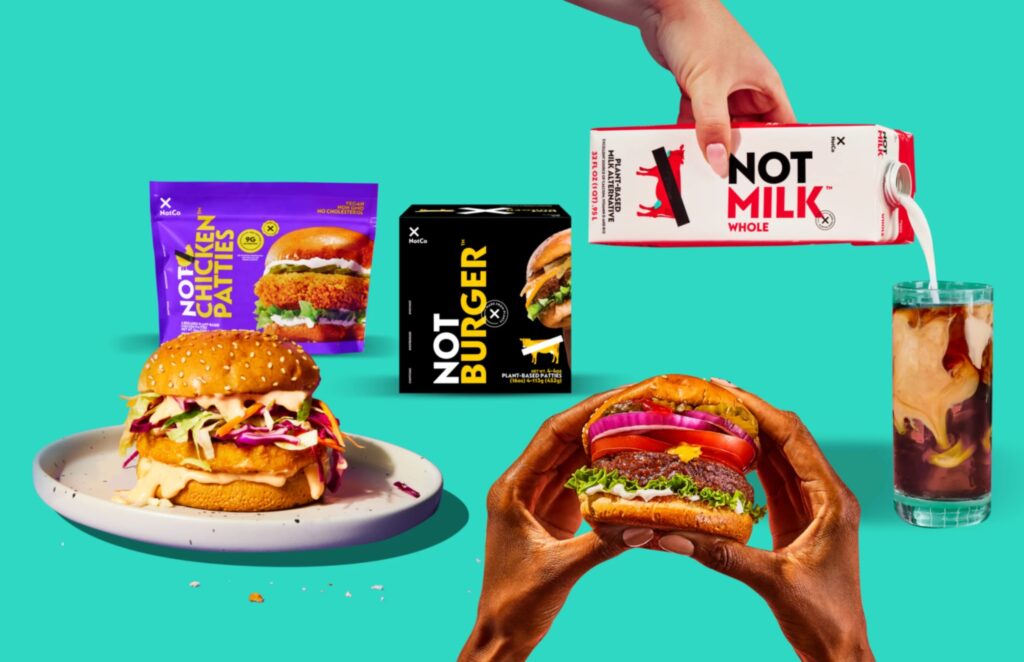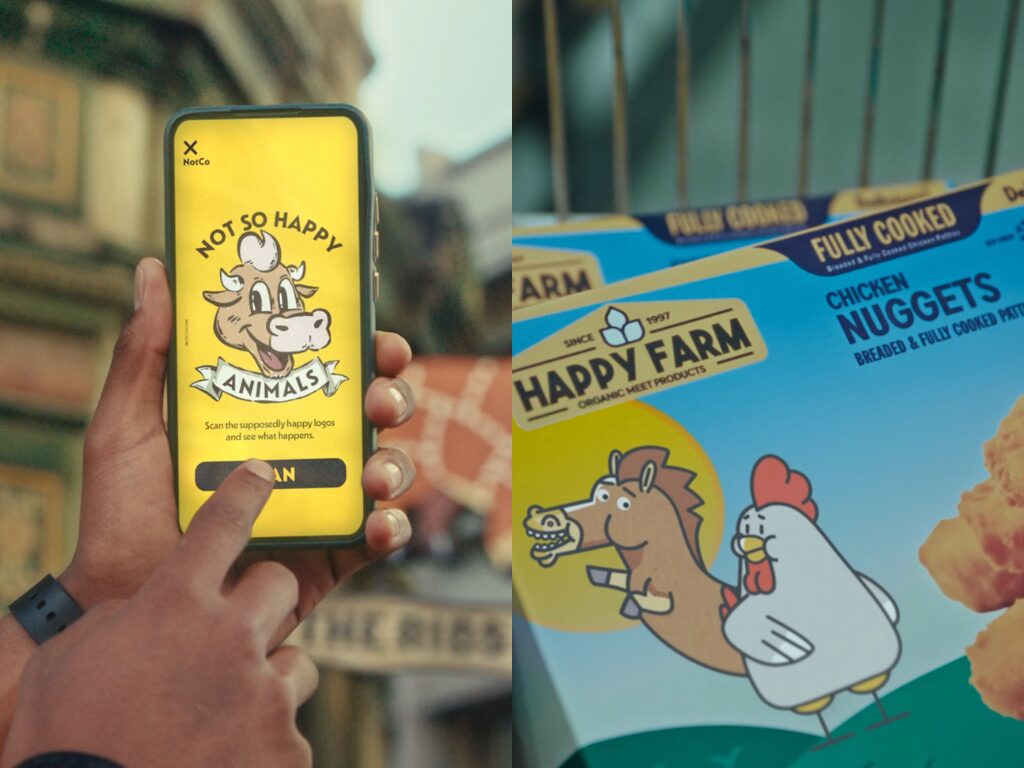Not So Happy: NotCo Targets Chick-fil-A & Other Meat Companies with Animal Abuse Jingle
4 Mins Read
Chilean food tech startup NotCo has unveiled its latest marketing campaign, Not So Happy Animals, which highlights some uncomfortable truths about the meat industry.
“I might look like I’m happy, but my grin is not real.”
That’s the message NotCo is trying to advocate in its new advertising campaign. The Chilean startup makes chicken, beef and milk analogues through a proprietary AI tech, but is now expanding its AI prowess to enlighten consumers about the deceptive marketing and ills of the animal agriculture industry. When consumers scan a QR code on a logo with an animal – such as Chick-fil-A – it turns into an augmented-reality-powered jingle promoting plant-based diets.
The premise is: if you’ve ever seen a happy chicken, cow or pig on a logo, it’s really a facade. There’s a disconnect between what meat companies – fast-food chains, restaurants and manufacturers – sell, and what their marketing projects. And this extends to a disillusionment around how people see food: many aren’t aware of what goes into the meat they eat, or how it’s really produced.
That’s what Louise McKerrow, NotCo’s global marketing head, says. “Many people don’t understand the process that goes behind the food they eat every day; this campaign gives a glimpse into that,” she tells Green Queen. “We hope that we can start a proactive dialogue around the source of our food and urge consumers to make informed choices.”
NotCo blends facts with emotion to highlight animal abuse
To kick off the campaign, the company has produced a video with a catchy song that highlights a fictional fast-food chain, Smiley Chicken, the bird on whose logo comes to life alluding that underneath the exterior, “there’s a whole lot of pain”.
It moves to another restaurant called Red Burger, first tugging at the emotional with “Who could be happy becoming a meal?” and then complementing it with facts like “You’ll find a hundred cows in just one burger patty”. Then there are shots of eateries like The Rib King and a generic diner with window signs promoting ‘Glorious Meats’, before a focus on a pork restaurant called Don Carlo.
The ad illustrates many controversial elements of the meat industry, but the blatancy is deliberately punctured by the fact that it’s a song. For example, the pig at Don Carlo says: “I’d be so much happier if I didn’t have to die” – it might be a simple line, but it highlights the matter-of-fact nature of factory-farmed meat. Research shows that 94% of all animals on Earth live on factory farms, and at least 100 billion are killed every year for meat and other food products.
Next, the commercial takes us to a grocery store, where the chicken on the packaging of a retail brand called Happy Farm proclaims: “They turn me into nuggets. Oh, my bones, my eyes!” It’s a reference to the fact that much of a chicken nugget can contain pastified legs, backbones and wing tips without compromising its taste. This leads to a horse popping up from behind the chicken, saying: “And things you can’t imagine,” which is a nod to the 2013 horsemeat scandal in Europe.
The spot ends at Porkio, a Chinese restaurant, the pig on whose logo sings: “I might look like I’m smiling, but my grin is not real. Wanna cheer me up? Try a plant-based meal.” It’s swiftly followed by shots showcasing phones scanning these logos and offering viewers deals on NotCo products.
Using interactive AI-led messaging to nudge eating behaviours

McKerrow reveals that NotCo has developed 20 different jingles tailored to individual logos – whether that’s on billboards, food menus, retail products, or elsewhere – all in different musical styles like rap, country, reggae, etc.
She remains tight-lipped when asked which specific brands the campaign targets (apart from Chick-fil-A, which the company identifies as “an Atlanta-based chicken company”). “The technology will scan and work for logos with animals in it. Of course, there are infamous logos that have animals – consumers will have to be on the lookout and find them in real-time. Logos without animals will not work with the technology,” she says.
The marketing executive is similarly mum when pressed on whether NotCo is concerned about backlash from the companies it’s “trolling”. “We are using this campaign as a means to educate consumers about the benefits of plant-based eating and ensure they make informed decisions when they look [at] what they want to consume,” she says.
“We are looking to shift the conventional narrative around what we consume and educate consumers about the benefits of plant-based foods,” McKerrow adds. “We are looking for consumers to use this as a means to make more educated decisions about what they are eating; even if they don’t always choose plant-based, we hope they will at least make their decision with more information at their disposal.”
It’s a clever way of using augmented reality and AI – given the latter’s links to speciesism, it’s a refreshing take on how AI can be used to raise awareness about animal welfare and plant-based foods. NotCo, which has just emerged victorious in its appeal to revoke a labelling ban imposed on its NotMilk packaging in Chile, is likely hoping the campaign will raise its profile to kick off what is “an exciting year for the brand” (it has already begun rolling out the famed vegan boxed mac and cheese with Kraft Heinz in the US).
It’s not the only vegan company that has used AI for marketing. In August, US brand Pleese Cheese unveiled a campaign filled with AI-generated images with the prompt ‘cheese farm’, leading to a host of whimsical illustrations depicting cheese as a flourishing crop.




